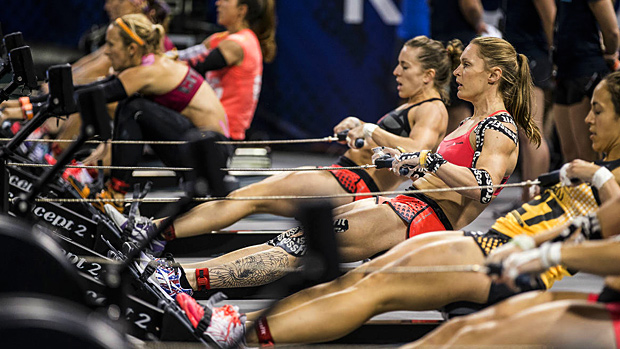How to Make Your “Engine” Stronger (ft. Coach Jess)
August 1, 2016Of all the muscles in the human body that we attempt to make stronger, the one we use the most as
Crossfit athletes, yet think about the least, is our heart. Your heart is the center of everything you do.
It’s the engine that runs your body. It’s the determining factor in your ability to do work over time. It’s
the power pack that lets your body demonstrate your athletic ability.
Yeah, yeah, you know your heart pumps blood. You know your heart controls how much blood reaches
your muscles. And you know your heart is kind of a big deal to being, like, alive and stuff.
But how should you think about your heart as a Crossfit athlete? Well as I touched on above, your heart
is your engine. We all push our heart to its maximum capacity every day in the gym. We test its ability
to run slower for very long periods of time (think those 5k days that nobody shows up for). We feel it try
to beat out of our chests on short, intense workouts (sled pushes, fran, that evil assault bike at SCCF).
When our heart hits that place we simply cannot go any more, we call that failure.
Assuming our goal is to improve our performance in workouts and our overall athletic capacity, we must
pay attention to our heart rate as it pertains to our metabolic system. Your body’s ability to carry
oxygen to, and eliminate toxins from your muscles is your metabolic limiter. Men that can normally
deadlift 400 lbs with ease are stuck staring at a barbell with 200 pounds on it because they can’t deliver
oxygen to their muscles in a fashion that will let them continue to work. Ladies that can thruster 65
pounds are stuck staring at a 35 lb. barbell for the same reason.
So how do we solve this issue? How do we manage our heart so it can let us do more work efficiently?
Well the answer lies in 2 places.
1. Manage your heart rate at your existing work capacity. Too many of us come out of the gates in
a hurried fashion. We try to burn through reps like we can just casually knock out 40 rounds of
Cindy in 20 minutes. Eventually those rounds slow from 30 seconds to 1 minute, then we are
left sitting on the floor 7 minutes into the workout, sipping water, wondering what the hell just
happened. Take your workout slower from the get go. Manage your heart rate. Manage your
metabolic system at a rate that can be sustained. Work efficiently and with a plan. Get your
heart rate to a place you can keep it at and just work in a measured pace. If there is any energy
left, wait till the last 2 minutes to burn it.
2. Raise your heart’s ability to process blood. Make it strong enough to support the work rate that
you want it to. Primarily the best way to do this is to repeatedly bump up against that point of
metabolic failure I talked about. This is interval work at its finest. Think of doing Tabata
workouts on the assault bike. Do sled pushes. Exercise in a fashion that makes your heart reach
its full capacity to work. Over time, your heart will grow stronger and more able to support
your mental drive to push harder.
Luckily, Crossfit does a pretty good job of helping you train your heart to be stronger and more efficient.
But it cannot do it just by you reading the WOD on the screen and forgetting to come to class because
it’s sprint interval day or it’s sled push day or it’s 5k day. And it can’t do it if you show up without a plan
of attack for the workout. Work smart. Work hard. And think about your heart the whole time. It’s a
muscle and a tool just like your quadriceps and your hamstrings. Push it smartly.
Finally, I’ll leave you with a very good rule of thumb for a lot of us. Your maximum heart rate should be
somewhere around 220 minus your age in years. So if you’re Mike Gentry, your maximum heart rate is
19. Now, mind you, that’s your MAXIMUM heart rate. Your capacity to work over time should be
somewhere around 80% of that number or a bit higher if you train a lot. IF you have a fitbit or some sort
of heart rate monitor, you can get a feel for where your heart should be when you’re working longer
metcons or shorter ones. Find that sweet spot for yourself and stay there. It will be the most efficient
way to become a better athlete and a healthier person!
-Coach Jess
